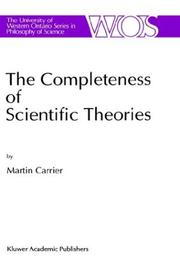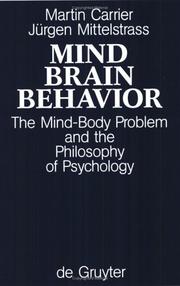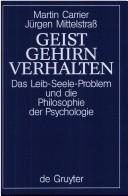| Listing 1 - 10 of 30 | << page >> |
Sort by
|

ISBN: 0792324757 9401043930 9401109109 Year: 1993 Volume: 53 Publisher: Dordrecht ; Boston ; London Kluwer Academic Publishers,
Abstract | Keywords | Export | Availability | Bookmark
 Loading...
Loading...Choose an application
- Reference Manager
- EndNote
- RefWorks (Direct export to RefWorks)
Fysische metingen --- Geometry --- Géométrie --- Measurements [Physical ] --- Meetkunde --- Mesures physiques --- Metingen [Fysische ] --- Physical measurements --- Precision of measurements --- Geometry. --- Physical measurements. --- Science --- Methodology. --- Philosophy. --- Philosophy --- Methodology --- Mathematics --- Euclid's Elements --- Measurements, Physical --- Mathematical physics --- Measurement --- Normal science --- Philosophy of science --- Scientific method --- Logic, Symbolic and mathematical
Book
ISBN: 1498510175 Year: 2016 Publisher: Lanham, Maryland : Lexington Books,
Abstract | Keywords | Export | Availability | Bookmark
 Loading...
Loading...Choose an application
- Reference Manager
- EndNote
- RefWorks (Direct export to RefWorks)
This book analyzes the variation of power distribution between presidents and prime ministers in semi-presidential regimes. Through selected case studies, it exposes the necessity to understand power variation in a configurative perspective and to further consider contextual factors.
Semi-presidential system --- Executive power --- Presidents --- Europe --- Politics and government.

ISBN: 3406475779 Year: 2001 Publisher: München Beck
Abstract | Keywords | Export | Availability | Bookmark
 Loading...
Loading...Choose an application
- Reference Manager
- EndNote
- RefWorks (Direct export to RefWorks)
Book
Year: 1984
Abstract | Keywords | Export | Availability | Bookmark
 Loading...
Loading...Choose an application
- Reference Manager
- EndNote
- RefWorks (Direct export to RefWorks)
Digital
ISBN: 9783110214093 9783110176940 Year: 2009 Publisher: Berlin ;; Boston De Gruyter
Abstract | Keywords | Export | Availability | Bookmark
 Loading...
Loading...Choose an application
- Reference Manager
- EndNote
- RefWorks (Direct export to RefWorks)
Book
ISBN: 1282716662 3110176947 3110214091 3111738213 9786612716669 Year: 2009 Publisher: De Gruyter, Inc.
Abstract | Keywords | Export | Availability | Bookmark
 Loading...
Loading...Choose an application
- Reference Manager
- EndNote
- RefWorks (Direct export to RefWorks)

ISBN: 3110149540 Year: 1995 Publisher: Berlin De Gruyter
Abstract | Keywords | Export | Availability | Bookmark
 Loading...
Loading...Choose an application
- Reference Manager
- EndNote
- RefWorks (Direct export to RefWorks)
Book
ISBN: 9048190509 9786612995590 9048190517 1282995596 Year: 2010 Publisher: Dordrech ; New York : Springer,
Abstract | Keywords | Export | Availability | Bookmark
 Loading...
Loading...Choose an application
- Reference Manager
- EndNote
- RefWorks (Direct export to RefWorks)
We increasingly view the world around us as a product of science and technology. Accordingly, we have begun to appreciate that science does not take its problems only from nature and then produces technological applications, but that the very problems of scientific research themselves are generated by science and technology. Simultaneously, problems like global warming, the toxicology of nanoparticles, or the use of renewable energies are constituted by many factors that interact with great complexity. Science in the context of application is challenged to gain new understanding and control of such complexity—it cannot seek shelter in the ivory tower or simply pursue its internal quest for understanding and gradual improvement of grand theories. Science in the Context of Application will identify, explore and assess these changes. Part I considers the "Changing Conditions of Scientific Research" and part II "Science, Values, and Society". Examples are drawn from pharmaceutical research, the information sciences, simulation modelling, nanotechnology, cancer research, the effects of commercialization, and many other fields. The book assembles papers from well-known European and American Science Studies scholars like Bernadette Bensaude-Vincent, Janet Kourany, Michael Mahoney, Margaret Morrison, Hans-Jörg Rheinberger, Arie Rip, Dan Sarewitz, Peter Weingart, and others. The individual chapters are written to address anyone who is concerned about the role of contemporary science in society, including scientists, philosophers, and policy makers.
Science -- Social aspects. --- Technology -- Social aspects. --- Research --- Science --- Physical Sciences & Mathematics --- Philosophy & Religion --- Philosophy --- Sciences - General --- Methodology --- Social aspects --- Research. --- Philosophy. --- History. --- Philosophy and science. --- Sociology. --- Philosophy of Science. --- History of Science. --- Sociology, general. --- Science research --- Scientific research --- Information services --- Learning and scholarship --- Research teams --- Normal science --- Philosophy of science --- Annals --- Auxiliary sciences of history --- Social theory --- Social sciences --- Science and philosophy
Book
ISBN: 3319544691 3319544683 Year: 2017 Publisher: Cham : Springer International Publishing : Imprint: Springer,
Abstract | Keywords | Export | Availability | Bookmark
 Loading...
Loading...Choose an application
- Reference Manager
- EndNote
- RefWorks (Direct export to RefWorks)
This book puts forward a new role for mathematics in the natural sciences. In the traditional understanding, a strong viewpoint is advocated, on the one hand, according to which mathematics is used for truthfully expressing laws of nature and thus for rendering the rational structure of the world. In a weaker understanding, many deny that these fundamental laws are of an essentially mathematical character, and suggest that mathematics is merely a convenient tool for systematizing observational knowledge. The position developed in this volume combines features of both the strong and the weak viewpoint. In accordance with the former, mathematics is assigned an active and even shaping role in the sciences, but at the same time, employing mathematics as a tool is taken to be independent from the possible mathematical structure of the objects under consideration. Hence the tool perspective is contextual rather than ontological. Furthermore, tool-use has to respect conditions like suitability, efficacy, optimality, and others. There is a spectrum of means that will normally differ in how well they serve particular purposes. The tool perspective underlines the inevitably provisional validity of mathematics: any tool can be adjusted, improved, or lose its adequacy upon changing practical conditions.
Environment. --- History. --- Philosophy and science. --- Mathematics. --- Environmental sciences. --- Math. Appl. in Environmental Science. --- History of Science. --- Philosophy of Science. --- History of Mathematical Sciences. --- Mathematics --- Philosophy. --- Logic of mathematics --- Mathematics, Logic of --- Science --- Normal science --- Philosophy of science --- Environmental science --- Annals --- Auxiliary sciences of history --- Math --- Science and philosophy

ISBN: 3110118300 3110847094 Year: 1989 Publisher: Berlin de Gruyter
Abstract | Keywords | Export | Availability | Bookmark
 Loading...
Loading...Choose an application
- Reference Manager
- EndNote
- RefWorks (Direct export to RefWorks)
Keine ausführliche Beschreibung für "Geist, Gehirn, Verhalten" verfügbar.
-#GROL:SEMI-130.1 --- Occasionalism --- Dualism --- Mind and body --- Philosophy of mind --- Psychology --- #GROL:SEMI-130.1 --- Body and mind --- Body and soul (Philosophy) --- Human body --- Mind --- Mind-body connection --- Mind-body relations --- Mind-cure --- Somatopsychics --- Brain --- Philosophical anthropology --- Holistic medicine --- Mental healing --- Parousia (Philosophy) --- Phrenology --- Psychophysiology --- Self --- Philosophy --- Idealism --- Materialism --- Monism --- Realism --- Mind, Philosophy of --- Mind, Theory of --- Theory of mind --- Cognitive science --- Metaphysics --- Psychological aspects --- Mind and body. --- Philosophy of mind. --- Dualism. --- Philosophy.
| Listing 1 - 10 of 30 | << page >> |
Sort by
|

 Search
Search Feedback
Feedback About UniCat
About UniCat  Help
Help News
News